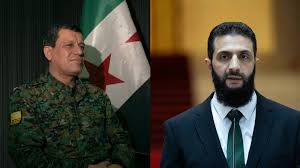From Sheikh Maqsood to the constitution... Muzlum Abdi draws the map of the political solution in a comprehensive dialogue.

Mazloum Abdi, the General Commander of the Syrian Democratic Forces (SDF), confirmed that the agreement signed with the interim Syrian President Ahmed al-Sharaa on March 10 regarding the neighborhoods of Sheikh Maqsoud and Ashrafiya in Aleppo represents a "promising local model" that can be generalized in future Syria, stressing the need to include it in the new constitution to ensure its sustainability.
This was stated in an exclusive interview with the American "Monitor" website on Saturday, April 12.
In response to a question about the withdrawal of the People's Protection Units (YPG) from Sheikh Maqsoud, Abdi explained that the agreement "contributed to easing tensions with the Turkish-backed National Army," while retaining the Asayish forces for internal security, emphasizing that these arrangements are "temporary" until a final solution is reached with Damascus.
He also addressed the situation at the Tishrin Dam, pointing out a "continuous ceasefire for 12 days mediated by external parties," with an agreement to keep the current dam administration and technical staff unchanged until a final agreement is reached, describing the team as "expert and professional."
Abdi expressed support for the ongoing dialogue between the Kurdistan Workers' Party and Turkey, considering it a "positive development," mentioning that he received a message from the leader Abdullah Ocalan described as "positive," calling for "working within a unified Syrian agenda." He revealed that his response was written in Arabic and translated into Turkish, supporting Ocalan's view that "the time for armed struggle has passed."
Regarding the Turkish stance, Abdi noted a "shift in the official Turkish discourse" towards the SDF, considering it an indication of gradual acceptance of its presence, as well as reviewing the results of his meeting with Masoud Barzani, who confirmed his "support for preserving Kurdish gains" and readiness to enhance the SDF's relationship with Damascus.
Abdi denied the presence of American representatives during his meeting with President al-Sharaa, but acknowledged Washington's role in "facilitating the delegation's transfer," confirming that the agreement is supported by the U.S. to "prevent escalating tensions with Turkey or the Syrian government, and to confront the danger of ISIS resurgence."
He revealed the formation of a "joint dialogue committee" to be followed by subcommittees for education and political coordination, with a focus on a "Constitutional Committee," criticizing the temporary constitution for conflicting with the spirit of the agreement.
Regarding the military vision, Abdi rejected the SDF "exclusively centralizing administrative authority in Damascus" and insisted on "integrating the SDF into the National Army while preserving its identity," also rejecting discussions about dismantling the Arab component within the SDF, emphasizing its "organizational specificity."
Abdi pointed out that the agreement helped "stop the massacres on the Syrian coast and deliver aid," quoting al-Sharaa that government forces "intervened in response to attacks by regime remnants and violations by undisciplined factions."
Regarding the American file and the future of military presence, Abdi said that Damascus shows interest in rapprochement with Washington, and that the SDF is ready to mediate, especially in the files of "Al-Hol camp and detainees."
Regarding the presence of American forces, he noted that "the soldiers want to stay, but the final decision lies with President Trump," warning of the danger of ISIS.
As for oil, Abdi explained that the matter will be discussed in committees later.
He confirmed discussions about recognizing academic certificates, pointing to